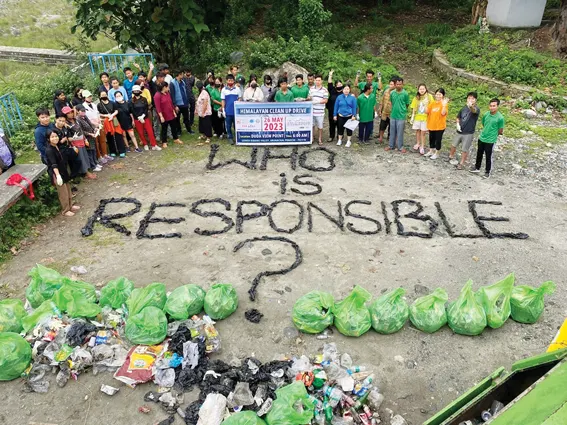Staff Reporter
ITANAGAR, 25 Jun: The Himalayan Cleanup (THC) NGO has called out top polluting companies to own up the responsibility of the wastes generated by them.
This comes after volunteers of THC in 10 Himalayan states prepared the data of the wastes generated by top polluting companies.
It is learnt that about 11,000 volunteers in the mountain states cleaned up 350 sites and segregated and conducted waste and brand audits.
The NGO claimed that “the amount of wastes picked up by our volunteers was 1,17,187, of which 1,08,799 were plastic (92.8 percent) from 63 sites, and 77.1 percent of all the plastic – mainly multilayered plastic and
Tetra Paks – collected were non-recyclable.”
THC undertakes such tasks across the Indian Himalayan region annually since 2018, “anchored by the Integrated Mountain Initiative and Zero Waste Himalaya, to highlight the waste crisis in the Himalayas and advocate mountain sensitive policies and practices,” it said.
‘Reflect, switch and demand’, the theme of THC, under which the activities are carried out from 26 to 30 May each year, “motivates participants to reflect on their contributions and responsibility to the waste crisis; switch to sustainable lifestyles; and raise collective voices against plastic pollution,” it said.
The THC brand audit revealed that the plastic packaged products are from PepsiCo India; Perfetti Van Melle; Parle; CG Foods India Pvt Ltd; ITC; Hindustan Coca Cola; Nestle; Tej Ram Dharam Pal Pvt Ltd; Mondelez India Food Pvt Ltd; GCMMF (Amul); Hindustan Unilever Ltd; Britannia Industries Ltd; Trimurti Fragrances; Guptaji Food Products; Vadilal Enterprises; Dabur India Ltd; Zeenat Ice Cream; Paras Surti Product Pvt Ltd; Godfrey Phillips; and Haldiram’s Snacks Pvt Ltd, making them the top 20 companies polluting the Indian Himalayan region.
THC further stated that “the burden of cleaning up has been seen as a responsibility of consumers and waste managers alone, while the producers of waste – the companies who create the waste – have shirked theirs.”
“It is now imperative that companies take responsibility for their wastes and design waste disposal mechanism at a systemic level. Naming these companies that are the top polluters is the narrative shift required to redress the Himalayan waste crisis” it added.
Calling for early resolution of the plastic waste crisis, THC informed that its movement is “grounded on the principle that waste results from design flaws,” and said that “producers taking responsibility for their products and their wastes is of utmost necessity to resolve the plastic waste crisis.”
“Mountains are flooded with non- recyclable plastics that have no solutions and are not collected by any waste-pickers and scrap dealers, and are found littering mountain landscapes, choking waterways, and filling up landfill sites. A scourge for waste managers, these kinds of plastics are the main reason why mountains are burdened with a huge waste crisis,” it said.
The NGO said that “food and waste intersect also emerged from our data, with packaged food and drinks making an alarming 81.8 percent of all plastic waste collected.
“This intersection has become extremely apparent, looking at data since THC was conceptualised in 2018,” it informed.
“It is an indication of the junk and processed food culture that is overtaking the diverse local food cultures of the Himalaya. These foods, low in nutritional value and high in salt, sugar and fat, contribute to the fast-growing non-communicable lifestyle diseases in the Himalaya. Even before the packaging is trashed, it is already a threat to the wellbeing of communities. Seventy-three percent of food packaging was non-recyclable multilayered plastics, showing how a change in eating habits is contributing to the waste crisis,” it added.
The NGO claimed that the surge in consumption of energy drink ‘Sting’ from 11 percent in 2022 to 22 percent this year is particularly frightening, given the warning label on the product that it is ‘not recommended for children, pregnant or lactating mothers’.
A dip in single-use plastic from 7.4 percent to 2.3 percent has also been recorded in the 2022 data.
“Waste management is a challenging task in the mountains and this needs to be acknowledged with adequate resource allocation and mountain sensitive policies,” THC stated, and demanded that the companies stop polluting the Himalayas.


